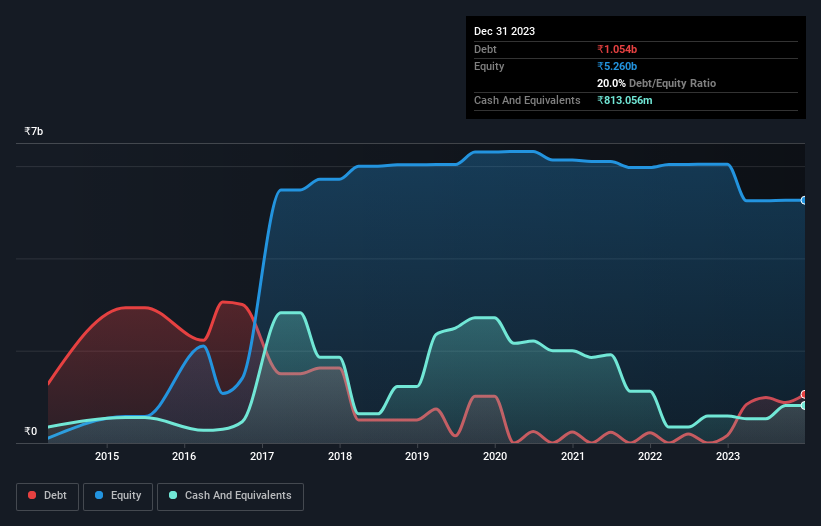Music Broadcast (NSE:RADIOCITY) Is Making Moderate Use Of Debt

The external fund manager backed by Berkshire Hathaway's Charlie Munger, Li Lu, makes no bones about it when he says 'The biggest investment risk is not the volatility of prices, but whether you will suffer a permanent loss of capital.' So it seems the smart money knows that debt - which is usually involved in bankruptcies - is a very important factor, when you assess how risky a company is. Importantly, Music Broadcast Limited (NSE:RADIOCITY) does carry debt. But the real question is whether this debt is making the company risky.
What Risk Does Debt Bring?
Debt is a tool to help businesses grow, but if a business is incapable of paying off its lenders, then it exists at their mercy. Part and parcel of capitalism is the process of 'creative destruction' where failed businesses are mercilessly liquidated by their bankers. While that is not too common, we often do see indebted companies permanently diluting shareholders because lenders force them to raise capital at a distressed price. By replacing dilution, though, debt can be an extremely good tool for businesses that need capital to invest in growth at high rates of return. When we examine debt levels, we first consider both cash and debt levels, together.
Check out our latest analysis for Music Broadcast
What Is Music Broadcast's Net Debt?
As you can see below, at the end of September 2023, Music Broadcast had ₹1.05b of debt, up from ₹166.0m a year ago. Click the image for more detail. However, it does have ₹813.1m in cash offsetting this, leading to net debt of about ₹241.3m.

How Healthy Is Music Broadcast's Balance Sheet?
Zooming in on the latest balance sheet data, we can see that Music Broadcast had liabilities of ₹387.8m due within 12 months and liabilities of ₹1.03b due beyond that. Offsetting these obligations, it had cash of ₹813.1m as well as receivables valued at ₹729.4m due within 12 months. So it actually has ₹124.5m more liquid assets than total liabilities.
This short term liquidity is a sign that Music Broadcast could probably pay off its debt with ease, as its balance sheet is far from stretched. When analysing debt levels, the balance sheet is the obvious place to start. But ultimately the future profitability of the business will decide if Music Broadcast can strengthen its balance sheet over time. So if you're focused on the future you can check out this free report showing analyst profit forecasts.
Over 12 months, Music Broadcast reported revenue of ₹2.2b, which is a gain of 12%, although it did not report any earnings before interest and tax. That rate of growth is a bit slow for our taste, but it takes all types to make a world.
Caveat Emptor
Over the last twelve months Music Broadcast produced an earnings before interest and tax (EBIT) loss. Indeed, it lost ₹47m at the EBIT level. On a more positive note, the company does have liquid assets, so it has a bit of time to improve its operations before the debt becomes an acute problem. And on top of that, it booked free cash flow of ₹87m and profit of ₹31m over the last year. So it seems too risky for our taste. There's no doubt that we learn most about debt from the balance sheet. But ultimately, every company can contain risks that exist outside of the balance sheet. For instance, we've identified 4 warning signs for Music Broadcast (1 is a bit concerning) you should be aware of.
When all is said and done, sometimes its easier to focus on companies that don't even need debt. Readers can access a list of growth stocks with zero net debt 100% free, right now.
New: Manage All Your Stock Portfolios in One Place
We've created the ultimate portfolio companion for stock investors, and it's free.
• Connect an unlimited number of Portfolios and see your total in one currency
• Be alerted to new Warning Signs or Risks via email or mobile
• Track the Fair Value of your stocks
Have feedback on this article? Concerned about the content? Get in touch with us directly. Alternatively, email editorial-team (at) simplywallst.com.
This article by Simply Wall St is general in nature. We provide commentary based on historical data and analyst forecasts only using an unbiased methodology and our articles are not intended to be financial advice. It does not constitute a recommendation to buy or sell any stock, and does not take account of your objectives, or your financial situation. We aim to bring you long-term focused analysis driven by fundamental data. Note that our analysis may not factor in the latest price-sensitive company announcements or qualitative material. Simply Wall St has no position in any stocks mentioned.
About NSEI:RADIOCITY
Music Broadcast
Engages in the operating of FM radio stations under the Radio City brand name in India.
Mediocre balance sheet and slightly overvalued.
Market Insights
Community Narratives




